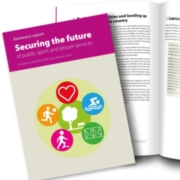Securing the future of public sport and leisure services
APSE is pleased to share ‘Securing the future of public sport and leisure services’. This summary report sets out some of the systemic problems within public sports and leisure services; how these issues have been entrenched in financial models of operation, which fail to recognise the public value of the service; and how these challenges have been exacerbated by a decade of austerity preceding the COVID-19 pandemic, which has further stressed the sector’s finances.
Whilst the report sets out the context of the challenges for public sport and leisure services it also offers some solutions with two key asks of Government:-
- The new Office for Health Improvement and Disparities should take responsibility for embedding the strategic role of public sport and leisure services within health systems and pathways, coordinating with DCMS, MHCLG and local government within England. All nations should consider how best to coordinate public sport and leisure provision across differing departments of Government.
- A £1 billion capital investment into the leisure estate based on established design plans would help to create hundreds of construction jobs, improve efficiency, reduce climate emissions and boost usage. Longer term, it would create new job opportunities and apprenticeships in areas of the sport and leisure industry typically taken by young people.
Speaking about the report Paul O’Brien, APSE Chief Executive said, “We all recognise that public sport and leisure services are not in competition with private providers, instead their unique role is part of the local eco-system of health and wellbeing at a locality level. From supporting the old and young, to community sports development and nurturing the next generation of elite athletes, the big difference between public and private providers is the much greater reach of public sports and leisure services.
O’Brien added, “Public sport and leisure services offer support to residents and communities literally from cradle to grave. But we are now at a critical point. We are calling for fair play to ensure that these vital services not only continue for the benefit of future generations but can also be integrated in the wider health and wellbeing agenda as we recover from the health pandemic.”
The report, lead by APSE in partnership with the Local Government Association (LGA) and the Chief Cultural & Leisure Officers Association (CLOA), found that councils remain as the biggest investor in sport, leisure, parks and green spaces, with spending at £1.1 billion per year in England alone.
The report also found that:-
- Public sport and leisure services support significant reductions in the risk of serious illness and disease with regular physical activity contributing to reductions in obesity, which is forecast to cost £9.7 billion per year by 2050.
- The widespread use of social prescribing will help the health economy recovery and support a post-COVID economy in terms of wellbeing, fitness to work and the prevention of serious illness and disease.
- Over 72% of schools rely upon swimming provision, which is almost exclusively provided by local authority leisure services, helping children to swim and supporting the national drowning prevention programme.
- People in the most deprived local authority areas are more reliant upon local council sports and leisure provision and are the very groups most likely to suffer from ill-health. Supporting these communities to be active should be regarded as a key tool in the levelling up agenda.
Supporting the launch of the summary report, Chair of CLOA, Debbie Kaye said, “This report, a result of CLOA’s collaboration with APSE and the LGA, comes at a crucial time for local authorities. Many are facing major financial challenges whilst continuing to a manage response to the ongoing pandemic and leading local recovery. The pandemic has hit public sport and leisure services hard, and at a time when we would want our pools and gyms to be playing a full and vital role supporting in their community’s recovery from COVID, the reality is that many services are at risk. Factor in the challenges of reducing carbon emissions, ageing stock, and declining swimming literacy, then it is clear that a perfect storm is brewing.”
Cllr Gerald Vernon-Jackson, Chair of the LGA’s Culture, Tourism and Sport Board, said “Councils have demonstrated, more than ever, that they are best placed to deliver services at pace for their local communities, if empowered and resourced to do so.
Cllr Vernon Jackson added, “Public sport and leisure facilities and services are a part of the social infrastructure of the nation. With the right investment and Government support, councils can do far more to maximise the benefits of sport and leisure services and build on their existing work to level up their communities, from improving health, to reducing emissions and driving regeneration.”
The summary report was revealed at an online parliamentary launch with Dame Tanni Grey-Thompson, President of the LGA and Cllr James Jamieson, LGA Chair on Tuesday 14 September.
You can download the report using this link.


.png)



.png)